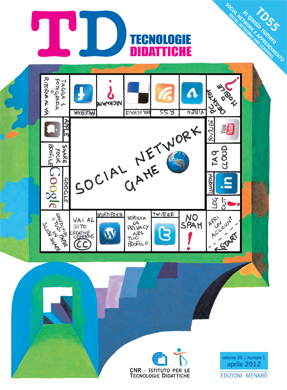Promuovere comunità professionali di insegnanti e professionisti attraverso i siti di social network
Contenuto principale dell'articolo
Abstract
Dettagli dell'articolo
Sezione
Gli autori che pubblicano su questa rivista accettano le seguenti condizioni:
- Gli autori mantengono i diritti sulla loro opera e cedono alla rivista il diritto di prima pubblicazione dell'opera, contemporaneamente licenziata sotto una Licenza Creative Commons CC BY 4.0 Attribution 4.0 International License.
- Gli autori possono aderire ad altri accordi di licenza non esclusiva per la distribuzione della versione dell'opera pubblicata (es. depositarla in un archivio istituzionale o pubblicarla in una monografia), a patto di indicare che la prima pubblicazione è avvenuta su questa rivista.
- Gli autori possono diffondere la loro opera online (es. in repository istituzionali o nel loro sito web) prima e durante il processo di submission, poiché può portare a scambi produttivi e aumentare le citazioni dell'opera pubblicata (Vedi The effect of Open Access).
Riferimenti bibliografici
Anderson T., Poellhuber B., McKerlich R. (2010). Self-paced Learners Meet Social Software: An Exploration of Learners’ Attitudes, Expectations and Experience. Online Journal of Distance Learning Administration, 13 (3), http://www.westga.edu/~distance/ojdla/Fall133/ anderson_poellhuber_mcKerlich133.html (ultima consultazione 09.12.2011).
Arnold N., Paulus T. (2010). Using a Social Networking Site for Experiential Learning: Appropriating, Lurking, Modeling and Community Building. The Internet and Higher Education, 13 (4), pp. 188-196.
Baran B. (2010). Facebook as a Formal Instructional Environment. British Journal of Educational Technology, 41 (6), pp. 146-149.
Besana S. (2012). Schoology: il Learning Management System diventa “social”. TD - Tecnologie Didattiche, 20 (1), pp. 51-53.
Bosch T. E. (2009). Using Online Social Networking for Teaching and Learning: Facebook Use at the University of Cape Town. Communication, 35 (2), pp. 185-200.
boyd d. (2008). Taken Out of Context: American Teen Sociality in Networked Publics. PhD Dissertation.
boyd d. (2011). Guilt Through Algorithmic Association. Apophenia, September 12th, 2011, http://www.zephoria.org/ thoughts/archives/2011/09/12/ guilt-through-algorithmic-association.html (ultima consultazione 09.12.2011).
boyd d., Ellison N. (2007). Social Network Sites: Definition, History, and Scholarship. Journal of Computer-Mediated Communication, 13 (1), pp. 210-230.
Castells M., Fernandez-Ardevol M., Qiu J. L., Sey A. (2008). Mobile communication e trasformazione sociale. Milano: Guerini e Associati.
Comunello F. (ed.) (2011). Networked Sociability and Individualism: Technology for Personal and Professional Relationships. Hershey, PA: IGI Global.
Crook C. (in stampa). The ‘Digital Native’ in Context: Tensions Associated with Importing Web 2.0 Practices into the School Setting. Oxford Review of Education.
Cucchiara S., Sansone N., Ligorio M. B. (2012). AAAFuturo Cercasi: orientare con i Social Network. TD – Tecnologie Didattiche, 20 (1), pp. 40-43.
Diggins Y., Marcus-Quinn A., Dundon A., Allen M., Bruen C. (2011). Using Innovative Social Networking Tools to Foster Communities of Practice. eLearning Papers, 26 October 2011, http://www.elearningeuropa.info/it/article/Usinginnovative- social-networking-tools-to-foster-communitiesof- practice- (ultima consultazione 09.12.2011).
Duffy P. (2011). Facebook or Faceblock: Cautionary Tales Exploring the Rise of Social Networking within Tertiary Education. In Lee M. J. W., McLoughlin C. (eds). Web 2.0- Base E-Learning: Applying Social Informatics for Tertiary Teaching. Hershey, PA: IGI Global, pp. 284-300.
Fini A., Cigognini E. (2009). Web 2.0. e social networking. Nuovi paradigmi per la formazione. Trento: Erickson.
Greenhow C. (2011). Online Social Networks and Learning. On The Horizon, 19 (1), pp. 4-12.
Halverson E R. (2011). Do Social Networking Technologies Have a Place in Formal Learning Environments?. On The Horizon, 19 (1), pp. 62-67.
Hampton K.N., Sessions Goulet L., Rainie L., Purcell K. (2011). Social networking sites and our lives. How people’s trust, personal relationships, and civic and political involvement are connected to their use of social networking sites and other technologies. Pew Research Center’s Internet & American Life Project, http://pewinternet.org/Reports/2011/Technology-andsocial- networks.aspx (ultima consultazione 09.12.2011).
Mazman S.G., Usluel Y. K. (2010). Modeling Educational Usage of Facebook. Computers & Education, 55 (2), pp. 444-453.
Merchant G. (in stampa). Unravelling the Social Network: Theory and Research. Learning, Media and Technology.
Nielsen (2011). State of The Media: The Social Media Report Q3 2011. NM Incite, http://blog.nielsen.com/nielsenwire/social/ (ultima consultazione 09.12.2011).
O’Reilly T. (2005). What is Web 2.0. Design Patterns and Business Models for the Next Generation of Software, http://oreilly.com/web2/archive/what-is-web-20.html (ultima consultazione 09.12.2011).
Pachler N., Bachmair B., Cook J. (2010). Mobile Learning. Structures, Agency, Practices. New York-Dordrecht- Heidelberg-London: Springer.
Park N., Kee K., Valenzuela S. (2009). Being Immersed in Social Networking Environment: Facebook Groups, Uses and Gratifications, and Social Outcomes. CyberPsychology & Behavior, 12 (6), pp. 729-733.
Riva G. (2010). I social network. Bologna: Il Mulino.
Scimeca S. (2012). eTwinning. La comunità delle scuole europee. TD - Tecnologie Didattiche, 20 (1), pp. 35-39.
Selwyn N. (2012). I social media nell’educazione formale e informale tra potenzialità e realtà. TD - Tecnologie Didattiche, 20 (1), pp. 4-10.
Smith A. (2011). Why Americans use social media. Social networking sites are appealing as a way to maintain contact with close ties and reconnect with old friends. Pew Research Center’s Internet & American Life Project, http://www.pewinternet.org/Reports/2011/Why- Americans-Use-Social-Media.aspx (ultima consultazione 09.12.2011).
Wang Q., Woo H. L., Quek C. L., Yang Y., Liu M. (in stampa). Using the Facebook Group as a Learning Management System: An Exploratory Study. British Journal of Educational Technology.
Wenger E. C. (1998). Communities of Practice. Learning, Meaning, and Identity. New York: Cambridge University Press

